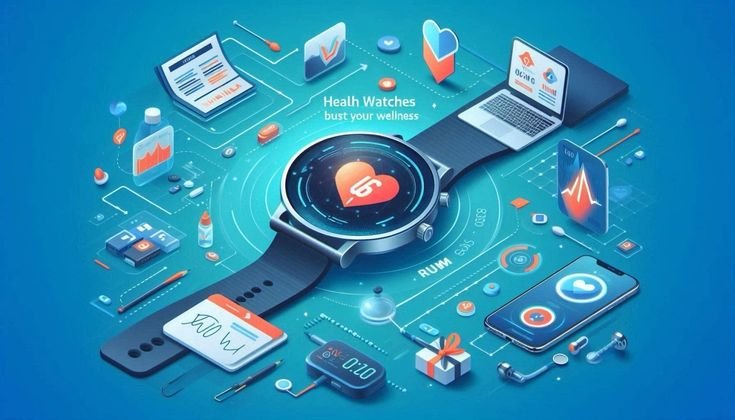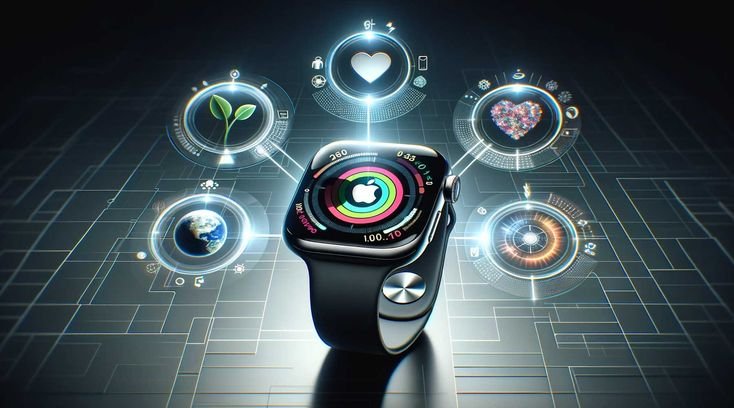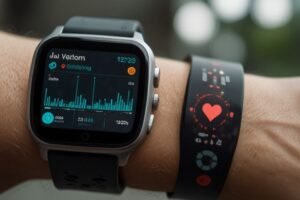HealthTech: Wearables – Your Doctor on the WristI’ll confess something: the first time my smartwatch buzzed and told me to “stand up,” I actually argued with it. Out loud.
“ Hey, I’ve been working for hours, give me a break! ”
But deep down, I knew it was right. My back was screaming, my coffee was cold, and my step count looked embarrassing.
That, in a nutshell, is the charm (and annoyance) of HealthTech wearables. They’ve turned our watches, bands, and even rings into little health nags — but also into lifesavers. We wear them for fitness, for curiosity, sometimes for bragging rights, and increasingly… for actual health monitoring.
So What Are These Things?
In simple words: HealthTech wearables are gadgets you strap on your body that track your health. Not just steps. We’re talking heart rate, blood oxygen, sleep cycles, stress levels, calories burned, and in some cases, even ECG readings.
HealthTech: Think of them as mini-doctors who don’t ask for co-pay. Smartwatches like Apple Watch, fitness bands like Fitbit, medical wearables like continuous glucose monitors (CGMs) for diabetics — they all fall under this umbrella.
If you grew up in the 90s like me, it still feels sci-fi. Back then, a “wearable” was a Tamagotchi clipped to your backpack. Now? The same-sized device can literally tell you if your heart’s out of rhythm.
How They Creep Into Daily Life
Let me paint a picture:
You wake up and your band tells you whether your sleep was “deep” or “trash.”
Midday, your watch vibrates because your heart rate spiked while… scrolling emails (yeah, stress).
Evening comes, and it politely suggests a run because your daily activity looks suspiciously lazy.
At night, you check your “readiness score” like it’s your horoscope.
One of my cousins once said, “My wearable is like an annoying older sibling — always watching, always judging.” And honestly, that’s exactly it.
But it’s not all guilt-trips. Sometimes these nudges are literal lifesavers. There are dozens of stories where someone fainted, and their watch auto-dialed emergency services. A farmer in Australia got alerted about irregular heartbeat while feeding chickens — later doctors said the watch probably saved his life.

The Love Affair
Why are people obsessed with these gadgets? Three big reasons:
Motivation: Gamifying fitness with step goals, badges, streaks. (Yes, I’ve walked laps around my room at midnight to hit 10k steps. Don’t judge.)
Visibility: Suddenly you see how bad your sleep actually is. Awareness = change.
Peace of Mind: For people with conditions like diabetes or heart disease, real-time monitoring is priceless.
And let’s be honest: some people just love showing off. Posting screenshots of “Look, I ran 5km!” or flexing their resting heart rate on Instagram.
The Weird & Wonderful Features
HealthTech companies sometimes get… creative. I’ve seen wearables that:
Track hydration by measuring skin resistance.
Buzz you when you slouch.
Detect menstrual cycles and ovulation patterns.
Claim to measure “stress levels” (though sometimes it’s just guessing based on heart rate).
There’s even a smart ring that doubles as a fashion statement. Imagine a piece of jewelry that also whispers your blood oxygen levels.
The line between health and lifestyle is blurring fast. Today it’s steps and calories. Tomorrow it could be mood prediction: “Warning: You’re about to be cranky in 20 minutes. Eat a snack.”
The Dark Side Nobody Likes Talking About
Of course, it’s not all unicorns and six-packs.
Accuracy Issues: Your band says you burned 700 calories, but the burger you just ate says otherwise.
Health Anxiety: Constant tracking can make some people paranoid. Every tiny irregularity feels like a heart attack.
Privacy Concerns: Who owns your health data? The company? You? Insurance companies drooling over it?
Battery Drain: Both on your device and your soul. (Why do these things always die mid-run?)
Overdependence: Some folks won’t exercise unless the band is on. If the steps don’t count, did you even walk?
One time, I forgot to wear my tracker to a wedding where I danced for three hours straight. It felt like all that cardio “didn’t exist.” My watch betrayed me.
Different Worlds, Same Gadget
What fascinates me is how these wearables adapt across cultures:
In the US, they’re marketed as lifestyle gadgets — fitness, mindfulness, productivity.
The Europe, there’s strong focus on medical validation, integrating with healthcare systems.
In India and Pakistan, low-cost fitness bands are exploding in popularity — a mix of status symbol and genuine health tool.
The Japan, some companies use wearables to monitor employee stress (which feels helpful… but also slightly creepy).
So while one person uses it to count calories, another relies on it to literally manage diabetes. Same technology, totally different stakes.

Where’s This Going?
This is where it gets exciting — and a little sci-fi.
Non-invasive glucose monitoring (no needles, just sensors).
Wearables in clothing — shirts that monitor heart and lung activity.
AI-driven predictions — “Based on your data, you might catch a cold soon.”
Integration with doctors — live data streams directly into your medical file.
Mental health focus — tracking not just your body, but your emotions.
HealthTech: Sometimes I imagine a future where your wearable argues with your fridge:
“Don’t let him open that ice cream. His sugar levels are already up.”
The fridge: locked.
You: crying softly.
The Ethical Headache
Here’s the part most marketing glosses over:
Who owns the data? If your heartbeat is uploaded to a server, can an insurance company use it to raise your premium?
Surveillance concerns: What if employers demand wearables for “health monitoring”?
Tech gap: Wealthy people get access to fancy devices, poorer communities get left behind.
Replacing intuition: Will we forget to listen to our own bodies without a gadget telling us?
These aren’t small questions. Health isn’t just numbers; it’s trust, privacy, and dignity.
My Two Rupees
Personally? I love wearables. They’ve pushed me to walk more, sleep better (sometimes), and even spot stress I didn’t know I had. But I also know they’re not perfect. They exaggerate, they nag, and they sometimes feel like tiny spies strapped to your wrist.
Still, given the choice between a world where health tracking is manual (diaries, doctor visits, guesswork) and one where I get instant insights on my body… I’ll take the wearable. Even if it sometimes tells me I only slept 4 hours when I swear I slept 8.
Rapid-Fire Q&A
Are these wearables medical devices?
Some are approved as medical-grade (like glucose monitors, ECG features), others are just “wellness tools.”
Do doctors trust them?
Depends. Many see them as helpful data, but not replacements for actual tests.
Can they really save lives?
Yes — there are documented cases of watches detecting irregular heart rhythms early.
Are they affordable?
The range is huge — from $20 fitness bands to $400+ smartwatches.
Worth buying?
If you like data and motivation, absolutely. If you’re anxious about every number, maybe be cautious.

